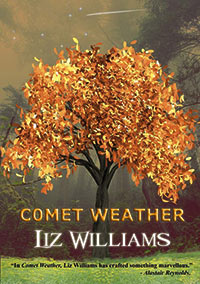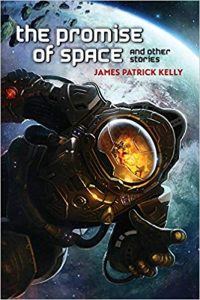Paul Di Filippo Reviews Dance on Saturday: Stories by Elwin Cotman
 Dance on Saturday: Stories, Elwin Cotman (Small Beer Press 978-1618731722, 304pp, trade paperback) September 2020.
Dance on Saturday: Stories, Elwin Cotman (Small Beer Press 978-1618731722, 304pp, trade paperback) September 2020.
I have been unfortunate enough to miss Elwin Cotman’s two previous collections, The Jack Daniels Sessions EP and Hard Times Blues. But now that I’ve latched onto his third, Dance On Saturday, and enjoyed the ever-lovin’ pants off it, I can solace myself by contemplating the untapped reservoir of heartfelt gonzo Cotmanesque fiction that awaits me for some day when I’m feeling blue and need a dose of his high-spirited fabulism to perk me up.
Cotman is a Black author who plainly writes out of his lived experience. His fiction is invested with palpable touchstones of the contemporary and historical Black experience. But beneath all the invaluable Black cultural clothing, flesh and blood that endow his fiction with a distinctive aura and vibe lies a strong universal skeleton of pan-human fantastika. So while one might make valid comparisons between his work and that of Nalo Hopkinson, Samuel Delany, and Ishmael Reed, it’s just as valid, I think, to point out his affinities with Carol Emshwiller, John Sladek, Mark Leyner, and Kelly Link. But such bipolar harmony, generating personal and local creations whose roots flourish in the shared soil of Mother Earth, are really a feature of all writers and all fiction that rises above necessary individual circumstances to instance the cosmic.
The first item in the TOC, the title story, is practically a short novel, by heft and page count. It resembles Zelazny’s Nine Princes in Amber as if rewritten by R.A. Lafferty.
We start with a funeral for a man named Riley, with our viewpoint character being a woman named Teetee. As we soon learn, there is a small clan of immortals who walk the earth, and they dub themselves “the Fruit.” Riley was one, but chose voluntarily to die. Teetee is another. And the way they renew themselves is through a regular harvest of special plants. Immortality through gardening. Lovingly cultivated, some very special blueberries can morph into new eyeballs, for instance.
Having established this innovative and fecund premise, Cotman is going to conduct us on a pleasantly shambolic tour of the various factions and interpersonal relationships among the immortals, couched in ripe and juicy language which is a delight to parse. The plot engine, such as it is, derives from a woman named Deja. She was Riley’s non-immortal girlfriend, but knows of the hidden Fruit. Her needs and demands result in aggravating the factions and controversies, and ultimately bring about a crisis very cleverly resonant with the Persephone myth.
But the leisurely tall-tale approach to plot is utterly redeemed by Cotman’s engaging language. Here’s a large chunk:
The Fruit, on the other hand, saw a man with the head of a deer. Soft and reddish fur coated his diamond-shaped face, and he stared from the pulpit with eyes like ink. His armor showed its age, the heraldry on his breastplate battered and faded beyond recognition.To pay respects to a civilian was a princely gesture indeed, as he rarely left his steel mill along the Monongahela. He looked old as rusted machinery, venerable as a priest, deadly as a general, powerful as a storm, and with a tilt of his cervine head hushed the crowd. In a voice deep and elegant, he said that Riley was a dedicated member of the Pittsburgh business community and left behind many who loved him. Those few words left the Fruit saying Yes!
But the real surprise came when the girlfriend appeared. She was tall and wide like a sonnet. Teetee noted her narrow hips, large bosom, Atlean shoulders, and sable skin. She wore her close-fitting sleeveless dress belted at the waist, sheer black tights, and a veil drawn down from her pillbox hat. Black Jackie O, Teetee thought as the girl took high-kneed stomps up the dais, like her sorrow was a foot of snow.
I could read that kind of prose all day.
Next up is what amounts to a novella, titled “Seven Watsons”, which has nothing to do with Sherlock Holmes. It’s the account of a forced rehabilitation camp—the Pittsburgh Job Corps—for juvenile delinquents, and it might be summarized as “The Bowery Boys meet ‘Masterson and the Clerks’ with a hint of Camp Concentration.”
Our narrator is one Flexo, an overweight sensitive fellow who tries to function as peacemaker and diplomat amongst the most ornery and cantankerous group of inmates imaginable, from Loom, whose shtick is riffing on the Illuminati, to smooth-talking, code-shifting Lindsey. Their go-along-to-get-along applecart is upset one day when a strange sixteen-year-old named Chris arrives. And although his peculiarities are somewhat tolerable, when his six identical brothers get sentenced also and show up, trouble really begins. A retrospectively well-planted but still surprising reveal brings the story into C.S.E. Cooney fairytale territory.
As before, the language rules, not always gonzo, brash and fleering, but also contemplative: “The sky turned silver. The oaks shrugged off they acorns. Feeling themselves kings and queens now the other critters was sleep, the turkeys grew bold. They would post up outside the fence and stare down…”
Have you surmised by now that Cotman has a great sense of humor, and writes tragicomedies?
The rest of the stories in the collection all do varying things, to illustrate Cotman’s range.
In “Mine”, Emily, a teenage girl of Nigerian descent living in the USA, has to face a bevy of typical adolescent troubles—but layered over with orisha supernaturalism. Only the steadfast presence of her sister Molly sees her through. Cotman reveals a John Hughes ear for Riverdale angst.
Full of sturm und drang, “The Son’s War” harkens, to my mind, to another Zelazny mode, that of Lord of Light and Creatures of Light and Darkness: bravura demiurgic adventures.
The king’s son lived to create. By an early age he had mastered botany, chemistry, all the realms of physics. Every moment he could steal from the duties of his father’s house, he built automatons: insects, sea creatures, animals that walked and crawled and ew. No sooner did an idea climb down his brainstem than it found realization in his hands. So as not to waste time debating materials, he created from whatever he had on hand, be it fungus or dirt, even his own dandruff. He built like he had mercury in his blood, like he would die if he stopped, and who knew? Perhaps he would have. Soon he’d filled his father’s house with inventions. Smells as green as spring and blue as winter rose to the forked-beamed rafters, all his creation. Nearly every sound and silence came from him. Foreign dignitaries visited the king’s house, ostensibly on diplomatic missions, in reality to witness the wonders they had heard of.
“Among the Zoologists” is totally wack. It reminded me of Lem’s The Futurological Congress mated with Malzberg’s caustic fandom-centric recursive fiction. Our hero is a D&D nerd employed at a gaming firm, heading to a convention where he hopes to pitch his newest ideas. When his bus stops at a roadside rest area, he makes the mistake of accepting an alternate ride from some strangers who seem also to be fans. But they are not. They belong to the subculture of outlaw guerrilla cryptozoologists, and the event to which they dragoon our man proves to be a sexy, scatological, Darwinian rave-cum-orgy. Upon his eventual escape or release, his life takes another surprising turn.
Lastly, “The Piper’s Christmas Gift” (by the way, the only story in this volume with any prior appearance), is a kind of steampunk O. Henry piece, all about the magic of stories in the lives of two street-urchin sisters, Sara and Mary, living a hardscrabble life in New York City. With invocations to famous authors such as Frances Hodgson Burnett, L. Frank Baum, and Kenneth Grahame, and featuring a kindly and mysterious old man whose name conjures up E. Nesbit (“Professor J.M. Nesbitt, of the Church of Antiquated Theology!” he bellowed. “Also Chair of the Yonkers Spiritualist Society, High Priest of the Hermetic Order of Supplicants, and President in Absentia of the Knickerbocker Intemperance Society.”), the story also harks to the sentimental-sardonic mix pioneered by Tom Disch, most appropriately in this case with “Feathers from the Wings of an Angel”.
This third collection from Elwin Cotman will surely show up on awards ballots. But more vitally, it should sit on your shelves.
 While you are here, please take a moment to support Locus with a one-time or recurring donation. We rely on reader donations to keep the magazine and site going, and would like to keep the site paywall free, but WE NEED YOUR FINANCIAL SUPPORT to continue quality coverage of the science fiction and fantasy field.
While you are here, please take a moment to support Locus with a one-time or recurring donation. We rely on reader donations to keep the magazine and site going, and would like to keep the site paywall free, but WE NEED YOUR FINANCIAL SUPPORT to continue quality coverage of the science fiction and fantasy field.
©Locus Magazine. Copyrighted material may not be republished without permission of LSFF.







